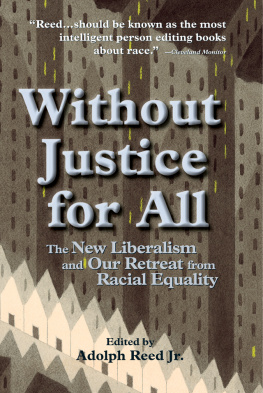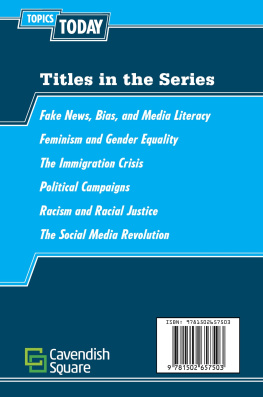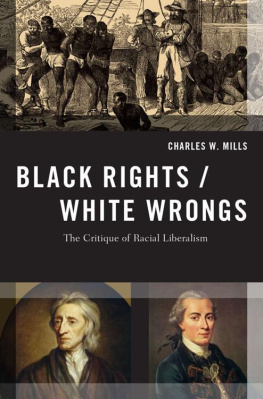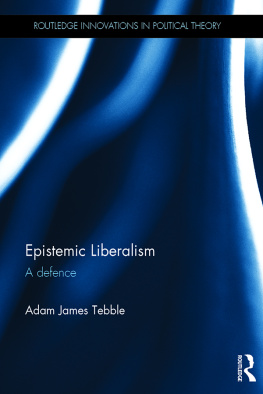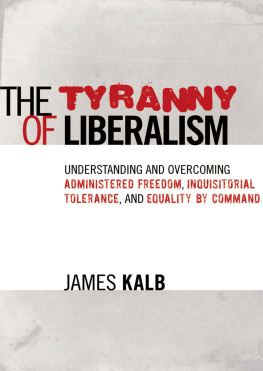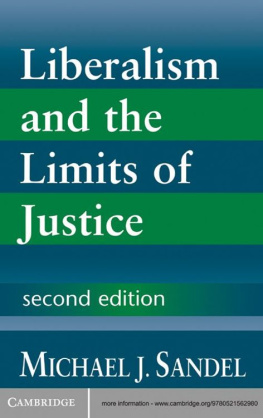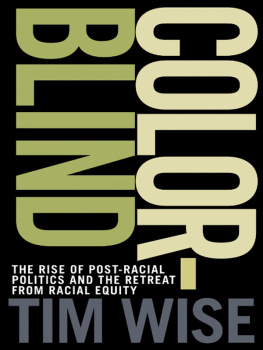Reed Adolph - Without Justice For All: The New Liberalism And Our Retreat From Racial Equality
Here you can read online Reed Adolph - Without Justice For All: The New Liberalism And Our Retreat From Racial Equality full text of the book (entire story) in english for free. Download pdf and epub, get meaning, cover and reviews about this ebook. publisher: Taylor & Francis Group, genre: Politics. Description of the work, (preface) as well as reviews are available. Best literature library LitArk.com created for fans of good reading and offers a wide selection of genres:
Romance novel
Science fiction
Adventure
Detective
Science
History
Home and family
Prose
Art
Politics
Computer
Non-fiction
Religion
Business
Children
Humor
Choose a favorite category and find really read worthwhile books. Enjoy immersion in the world of imagination, feel the emotions of the characters or learn something new for yourself, make an fascinating discovery.
- Book:Without Justice For All: The New Liberalism And Our Retreat From Racial Equality
- Author:
- Publisher:Taylor & Francis Group
- Genre:
- Rating:4 / 5
- Favourites:Add to favourites
- Your mark:
- 80
- 1
- 2
- 3
- 4
- 5
Without Justice For All: The New Liberalism And Our Retreat From Racial Equality: summary, description and annotation
We offer to read an annotation, description, summary or preface (depends on what the author of the book "Without Justice For All: The New Liberalism And Our Retreat From Racial Equality" wrote himself). If you haven't found the necessary information about the book — write in the comments, we will try to find it.
Reed Adolph: author's other books
Who wrote Without Justice For All: The New Liberalism And Our Retreat From Racial Equality? Find out the surname, the name of the author of the book and a list of all author's works by series.
Without Justice For All: The New Liberalism And Our Retreat From Racial Equality — read online for free the complete book (whole text) full work
Below is the text of the book, divided by pages. System saving the place of the last page read, allows you to conveniently read the book "Without Justice For All: The New Liberalism And Our Retreat From Racial Equality" online for free, without having to search again every time where you left off. Put a bookmark, and you can go to the page where you finished reading at any time.
Font size:
Interval:
Bookmark:

Without Justice for All
The New Liberalism and Our Retreat from Racial Equality
edited by
Adolph Reed Jr .

First published 1999 by Westview Press
Published 2018 by Routledge
711 Third Avenue, New York, NY 10017, USA
2 Park Square, Milton Park, Abingdon, Oxon OX14 4RN
Routledge is an imprint of the Taylor & Francis Group, an informa business
Copyright 1999 Taylor & Francis
All rights reserved. No part of this book may be reprinted or reproduced or utilised in any form or by any electronic, mechanical, or other means, now known or hereafter invented, including photocopying and recording, or in any information storage or retrieval system, without permission in writing from the publishers.
Notice:
Product or corporate names may be trademarks or registered trademarks, and are used only for identification and explanation without intent to infringe.
Without justice for all: the new liberalism and our retreat from
racial equality / edited by Adolph Reed Jr.
p. cm.
Includes bibliographical references and index.
ISBN 0-8133-2050-X (hc)
1. United StatesRace relations. 2. United StatesPolitics and
government1993-. 3. United StatesSocial policy1993-.
4. RacismPolitical aspectsUnited States History20th century.
5. Afro-AmericansCivil rightsHistory20th century.
6. LiberalismUnited StatesHistory20th century. I. Reed,
Adolph L., 1947-.
E185.615.W57 1999
305.8'00973dc21 98-49324
CIP
ISBN 13: 978-0-8133-2051-9 (pbk)
To my comrades in the Chicago labor movement and activist community, in gratitude for all you've done for me and all we've done together
, Adolph Reed Jr.
, Philip A. Klinkner
, Micaela di Leonardo
, Brett Williams
, Michael K. Brown
, Dennis R. Judd
, Mimi Abramovitz and Ann Withorn
, Larry Bennett and Adolph Reed Jr.
, Stephen Steinberg
, Alex Willingham
, Preston H. Smith
, Willie M. Legette
, Rogers M. Smith
Figures
Tables
Adolph Reed Jr.
THIS BOOK COMES TOGETHER as a direct challenge to a rightward-tacking narrative that has gained currency in American liberal politics in general and the Democratic Party in particular. Partly spurred by Reaganism's success in the 1980s, this narrative has become an orthodoxyif not a hegemonic ideologyin the 1990s. In this New Liberal orthodoxy, liberals and leftists have lost favor with the American electorate because they have moved away from the American people and have become too closely identified with "special interests." These special interests typically are held to include the labor movement, feminists, gays, secularists, civil libertarians, poor people, and nonwhite minorities, especially blacks. The punch line in this narrative is that restoring liberal, or Democratic, credibility requires establishing distance from these supposedly "marginal" constituencies and appealing to a "mainstream" American voter. In this context, mainstream means relatively well-off, white, and male, in some combination or another. Militant devotion to this mainstream is a symbolic meeting ground for several tendencies that rest uneasily within a Democratic Party that has become the institutional home of left-liberal politics since the decline of the activist movements of the 1960s.
From one direction, a neoliberal element would recast liberal politics along lines that break with the Keynesian pragmatism and pluralist public budgeting that has defined the liberal-progressive axis in American politics since the New Deal. This neoliberalism either trumpets the triumph of the market as the ultimate basis of social rationality or insists that challenging the market's hegemony is futilely impolitic, which amounts to the same thing. This strain therefore advocates reducing and privatizing public functionsor, in the Orwellian euphemism coined by David Osborne and operationalized by Vice President Al Gore, "reinventing government"in service to a narrowly market-oriented notion of efficiency and an ideal of fiscal responsibility. Although this neoliberalism often includes support, or at least acceptance, of conventionally liberal stances on such "social issues" as abortion rights, gay rights, environmental protection, or even drug legalization, it retreats from downwardly redistributive social welfare policy, a disposition characteristically justified with a rhetoric stressing fiscal constraint, realpolitik, and the need to direct public policy toward encouraging personal responsibility or "choice."
From a second direction, a communitarian tendency similarly draws on the rhetoric of responsibility, though in service to a more actively coercive social vision. This vision is propelled by a commitment that public policy should enforce, or at least reinforce, putatively majoritarian values. Though it is less self-consciously technocratic than neoliberal critiques, the communitarian tendency is hardly averse to social engineering. Indeed, communitarians may exhibit a firmer faith than even the conventional left-liberals they denigrate that government action can produce specifically virtuous outcomes. Thus, communitarians see public policy as a vehicle for inculcating desired individual values and behavior and therefore often argue for such interventions as limiting income support for impoverished single parents and denying it to single teenaged parents, restricting access to abortion, and toughening divorce laws as mechanisms for strengthening families. The communitarian critique maintains that left-liberal politics has erred in not honoring majoritarian notions of virtue and desert and has alienated its natural base by coddling and rewarding those who fail to honor dominant norms. From this perspective, the draconian turn in criminal justice policyfor example, capital punishment, three-strikes provisions, mandatory sentencing, suspension of the Bill of Rights for residents of low-income public housingand punitive social policy appeal both as deterrents and as signals of good faith to the heretofore affronted majority's sentiments.
From a third direction, a more familiar cohort of conservative, mainly southern Democrats has bristled at the left-egalitarian, sodaily liberal presence in the party all along. This source of tension goes back to the New Deal. Although the black electoral empowerment ensuing from the 1965 Voting Rights Act effectively bolstered the relatively moderate wing of the Democratic Party in the South by driving its most right-wing elements to the GOP, white southern Democratic elites have remained the party's most consistently conservative force. (In this context, after all, "relatively moderate" is defined in relation to reactionaries such as U.S. senators John Stennis and James Eastland in Mississippi, U.S. representative John Rarick and Governor John McKeithen in Louisiana, Georgia's governor Lester Maddox, and South Carolina's senator Strom Thurmond.)
In addition to concerns about black prominence, many conservative southern Democrats are disturbed by the rise of environmentalist, civil libertarian, gay rights, abortion rights, and other feminist constituencies within the party. Even "moderates"a category mainly including those white Democrats who have adapted the familiar style of biracial brokerage politics to the new environmentexpress discomfiture that the Democrats command electoral support of only a minority among whites. (That this formulation does not beg questions as to why an electoral majority of whites, rather than a majority of the general electorate, should be seen as the standard of political health is a revealing aspect of the current discourse.)
Font size:
Interval:
Bookmark:
Similar books «Without Justice For All: The New Liberalism And Our Retreat From Racial Equality»
Look at similar books to Without Justice For All: The New Liberalism And Our Retreat From Racial Equality. We have selected literature similar in name and meaning in the hope of providing readers with more options to find new, interesting, not yet read works.
Discussion, reviews of the book Without Justice For All: The New Liberalism And Our Retreat From Racial Equality and just readers' own opinions. Leave your comments, write what you think about the work, its meaning or the main characters. Specify what exactly you liked and what you didn't like, and why you think so.

